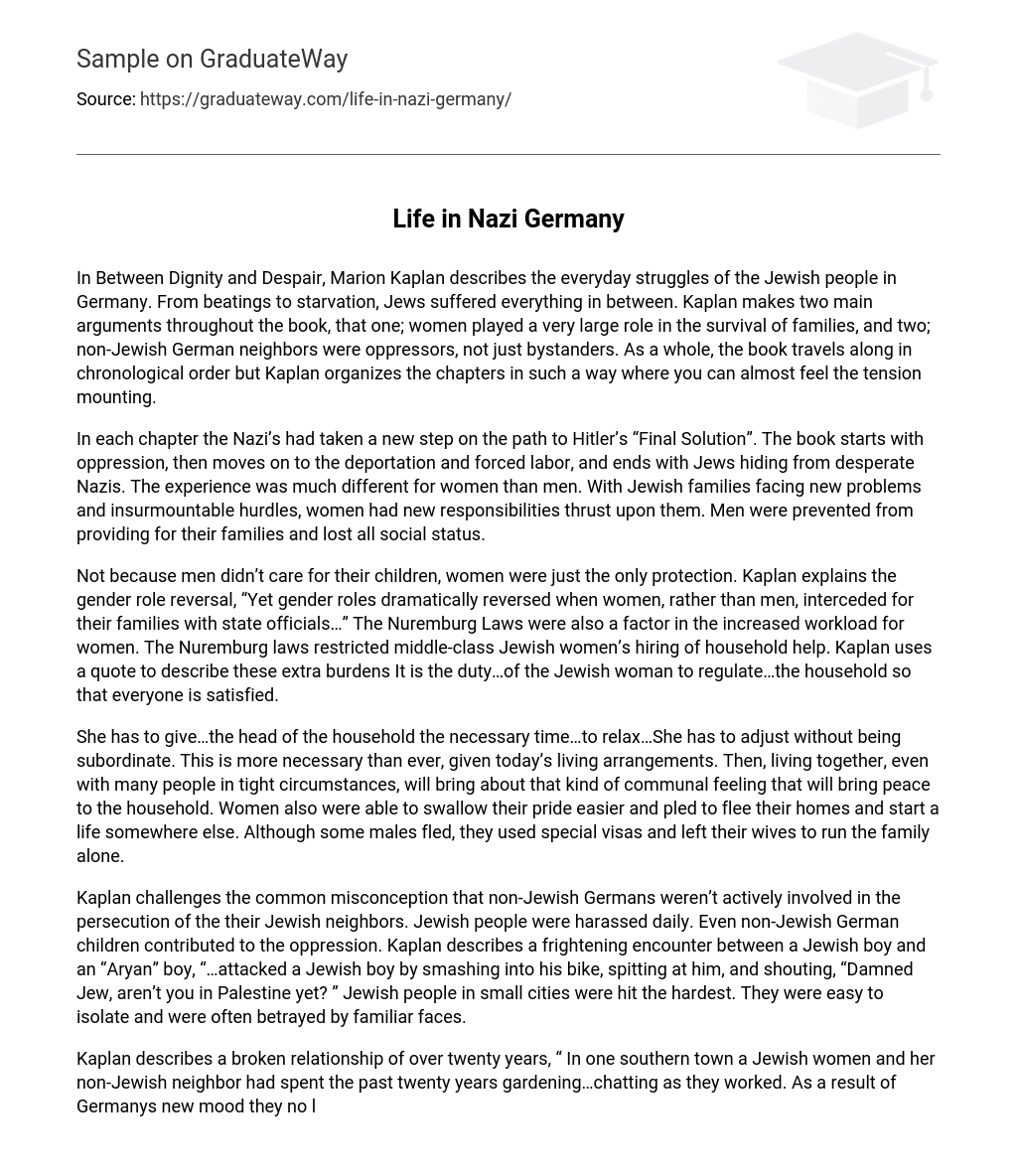In Between Dignity and Despair, Marion Kaplan describes the everyday struggles of the Jewish people in Germany. From beatings to starvation, Jews suffered everything in between. Kaplan makes two main arguments throughout the book, that one; women played a very large role in the survival of families, and two; non-Jewish German neighbors were oppressors, not just bystanders. As a whole, the book travels along in chronological order but Kaplan organizes the chapters in such a way where you can almost feel the tension mounting.
In each chapter the Nazi’s had taken a new step on the path to Hitler’s “Final Solution”. The book starts with oppression, then moves on to the deportation and forced labor, and ends with Jews hiding from desperate Nazis. The experience was much different for women than men. With Jewish families facing new problems and insurmountable hurdles, women had new responsibilities thrust upon them. Men were prevented from providing for their families and lost all social status.
Not because men didn’t care for their children, women were just the only protection. Kaplan explains the gender role reversal, “Yet gender roles dramatically reversed when women, rather than men, interceded for their families with state officials…” The Nuremburg Laws were also a factor in the increased workload for women. The Nuremburg laws restricted middle-class Jewish women’s hiring of household help. Kaplan uses a quote to describe these extra burdens It is the duty…of the Jewish woman to regulate…the household so that everyone is satisfied.
She has to give…the head of the household the necessary time…to relax…She has to adjust without being subordinate. This is more necessary than ever, given today’s living arrangements. Then, living together, even with many people in tight circumstances, will bring about that kind of communal feeling that will bring peace to the household. Women also were able to swallow their pride easier and pled to flee their homes and start a life somewhere else. Although some males fled, they used special visas and left their wives to run the family alone.
Kaplan challenges the common misconception that non-Jewish Germans weren’t actively involved in the persecution of the their Jewish neighbors. Jewish people were harassed daily. Even non-Jewish German children contributed to the oppression. Kaplan describes a frightening encounter between a Jewish boy and an “Aryan” boy, “…attacked a Jewish boy by smashing into his bike, spitting at him, and shouting, “Damned Jew, aren’t you in Palestine yet? ” Jewish people in small cities were hit the hardest. They were easy to isolate and were often betrayed by familiar faces.
Kaplan describes a broken relationship of over twenty years, “ In one southern town a Jewish women and her non-Jewish neighbor had spent the past twenty years gardening…chatting as they worked. As a result of Germanys new mood they no longer spoke. ” These lost friends and isolations opened the gateway to the social death of Jews and Hitler’s “Final Solution”. Kaplan discusses the idea of social death for the Jews. To me this means convincing the rest of Germany that Jews are inferior and don’t deserve the same rights as everybody else.
I believe this is definitely a prerequisite for the final solution. Before you can even fathom something so ridiculous as killing an entire race, you first need to convince people that they are inferior. Kaplan provides a very different account of the events leading up to the Holocaust. Before reading this book I believed that the persecution of the Jews was done by the Nazi party, and not so much by the other community members. Kaplan shows that the isolation by friends, aquaintances, and coworkers were the most painful and hurtful to the Jewish people.





